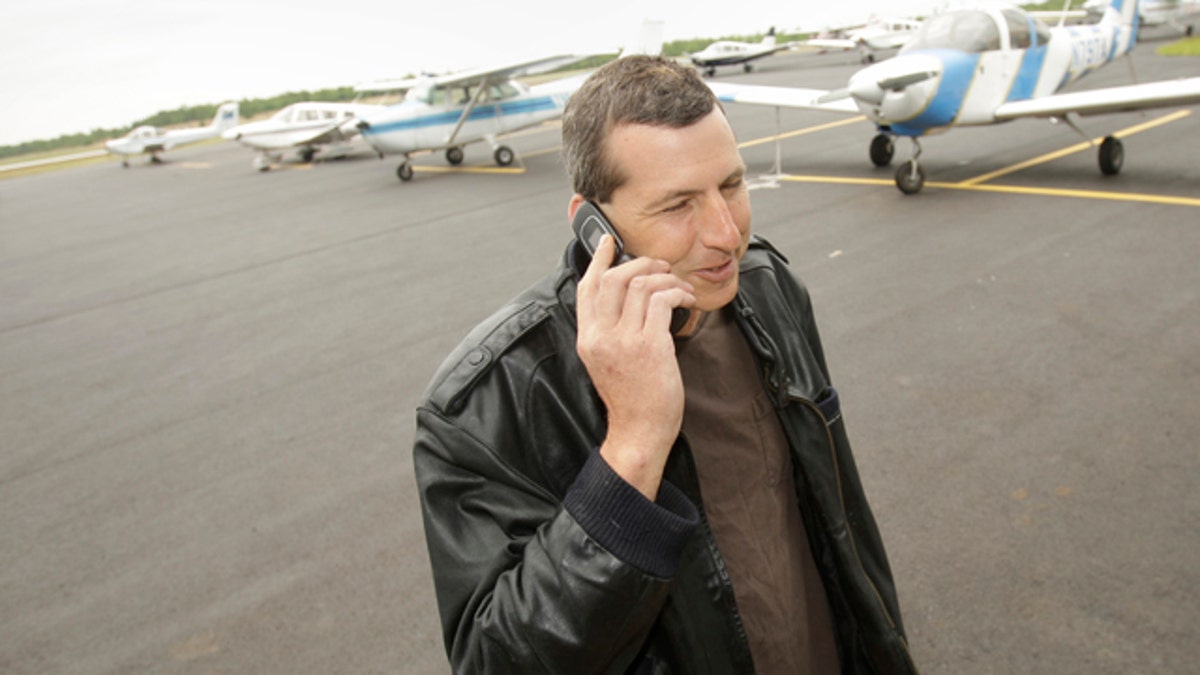
April 20, 2011: Commercial pilot Bill Phillips uses his cellphone on the tarmac at North Little Rock municipal Airport in North Little Rock, Ark. (AP)
LITTLE ROCK, Ark. – In a financial and technological role reversal, a growing number of Americans are getting rid of their old telephones and using only cellphones, a trend being led not by the high-tech elite but by people in poorer states as a way to save money.
Government estimates released Wednesday show at least 30 percent of adults in 10 states rely entirely on cellphones, with the highest percentage in Arkansas and Mississippi, where many cannot afford to pay for two separate lines.
Wealthier households have been slower to use wireless technology as their sole means of making calls.
"The answer's obvious: No one has money here," said John N. Daigle, a professor of electrical engineering at the University of Mississippi with broad experience in the telecommunications industry. "If they can do without a landline, they'll do it to save money."
William Phillips of North Little Rock says he grew tired of paying for a landline his family rarely used. So he and his wife dumped their old phone and now have prepaid cellphones that cost a total of $75 a month.
Phillips, a 39-year-old commercial pilot, taught his 12-year-old son, who doesn't have a phone, how to email him rather than call when the boy is at home.
"I've heard people talk about it, that they ought to do it," Phillips said. "They're just hanging onto that phone number."
About 35 percent of adults in Arkansas and Mississippi have only cellphones, according to figures from the federal Centers for Disease Control and Prevention.
In New Jersey and Rhode Island, the states where the smallest proportion of people depend strictly on wireless phones, that figure is only 13 percent.
Mississippi has the highest poverty rate in the nation -- 21.9 percent in 2009, according to the Census Bureau. The Arkansas figure was 18.8 percent. The nationwide rate is 14.3 percent.
In 2009, the Census Bureau defined poverty as a single person making less than $11,000 a year or a family of four making less than $22,000 a year.
"I think people decide, 'I can afford one but not the other,"' said Ellen Reddy, who works for a nonprofit community center that helps low-income residents in Holmes County, Miss. She said poor people in her area often have cellphones with a limited number of minutes.
"When the minutes are gone, oftentimes we can't reach our families," Reddy said. "I think people are making choices."
The number of American households that rely exclusively on cellphones has been growing steadily nationwide, hitting 27 percent in the first half of 2010, an eightfold increase in just six years. Arkansas has had the greatest increase, with 15 percentage points. New Jersey's 7 percentage-point growth was the lowest.
Donielle Flowers of Little Rock doesn't remember the last time she had a landline. She's chosen to carry one of two cellphones -- a free, government-subsidized phone with 250 minutes a month, and a prepaid phone that costs $60 a month.
"It's an extra bill," Flowers, 34, said of landlines. "I'm rarely at home, so I just need a cellphone. I'd be lost without it."
That matches the conclusion of Stephen Blumberg, a senior CDC scientist and an author of the survey. Over the years, Blumberg has found that lower-income people are more likely than higher-earning Americans to have only wireless phones. Younger people an cellphones. Those states were Colorado, Idaho, Kentucky, Nebraska, North Dakota, Oklahoma, Oregon and Texas.
At the other end, only six states -- mostly in the East -- joined New Jersey and Rhode Island in having fewer than 17 percent of adults using only cellphones. They were Connecticut, Delaware, Massachusetts, New Hampshire, Pennsylvania and South Dakota.
The CDC estimates were based largely on data from the agency's National Health Interview Survey, for which it has interviewed 109,187 households over the past 3 1/2 years.
The government also uses statistics from the Census Bureau's American Community Survey taken between 2006 and 2009, plus information from listed telephone directories. The figures are then blended to produce a single estimate.
But even in Arkansas, some people are holding tight to their landlines.
"I was taught to have a house phone at home, whether you use it or not," said Dale West, 40, who carries a $60-a-month cellphone and pays about $35 a month for his landline. "Even though you got a cellphone, you never know."
